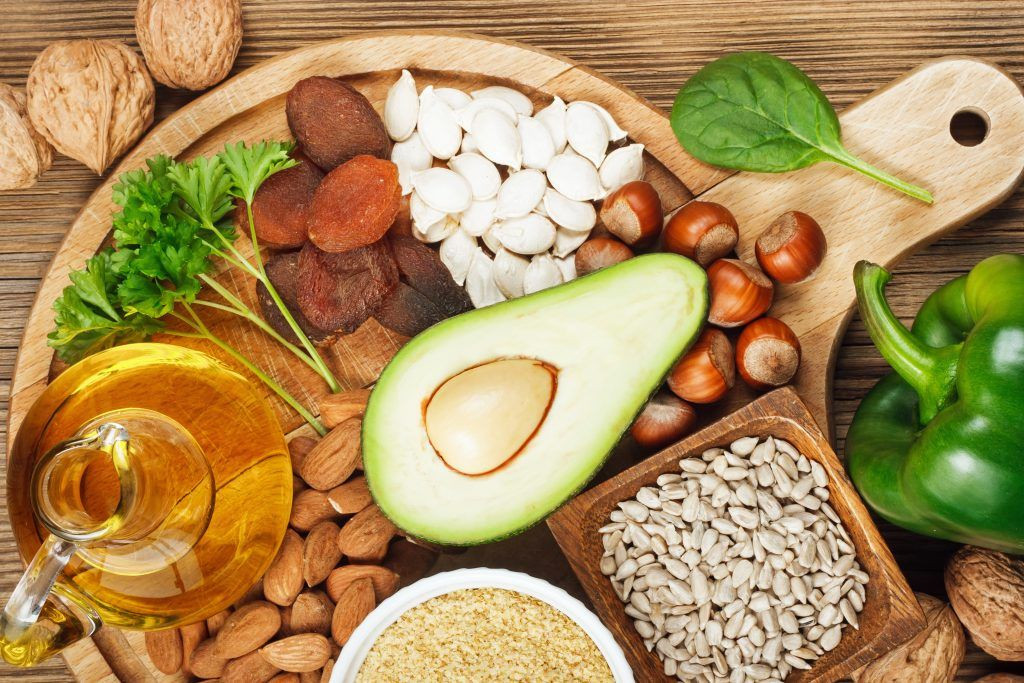Vitamin E is a vital nutrient that acts as a powerful antioxidant in the body, protecting cells from damage. Ensuring you consume enough vitamin E through your diet is crucial for maintaining overall health and well-being. Many delicious and readily available foods are packed with this essential vitamin. Let’s explore what foods are excellent sources of vitamin E to help you incorporate them into your daily meals.
Top Foods High in Vitamin E
When looking to boost your vitamin E intake through food, certain categories stand out. Plant-based oils, nuts, seeds, and some vegetables are among the richest sources. Including these in your diet can significantly contribute to meeting your daily vitamin E requirements.
 A vibrant assortment of foods rich in vitamin E, including wheat germ oil, dried wheat germ, dried apricots, hazelnuts, almonds, parsley, avocado, walnuts, pumpkin seeds, sunflower seeds, spinach, and bell pepper, highlighting natural sources of this essential vitamin.
A vibrant assortment of foods rich in vitamin E, including wheat germ oil, dried wheat germ, dried apricots, hazelnuts, almonds, parsley, avocado, walnuts, pumpkin seeds, sunflower seeds, spinach, and bell pepper, highlighting natural sources of this essential vitamin.
Here are some of the top food sources of vitamin E:
- Wheat Germ Oil: This oil tops the list as one of the most concentrated sources of vitamin E. Just a small amount can significantly contribute to your daily needs.
- Sunflower Seeds: These seeds are not only a tasty snack but also a great source of vitamin E. Enjoy them roasted, in salads, or as part of trail mixes.
- Almonds: Almonds are a popular nut packed with vitamin E, along with healthy fats and fiber. They make for a convenient and nutritious snack.
- Hazelnuts: Another delicious nut, hazelnuts are a good source of vitamin E and can be enjoyed whole, chopped, or as hazelnut butter.
- Spinach: While often associated with other vitamins and minerals, spinach also contains a notable amount of vitamin E. Incorporate it into salads, smoothies, or cooked dishes.
- Avocado: This creamy fruit is not only rich in healthy fats but also provides a good dose of vitamin E. Enjoy it in guacamole, salads, or on toast.
Other Excellent Sources of Vitamin E in Your Diet
Beyond the top sources, many other foods can contribute to your daily vitamin E intake. Variety is key to a balanced diet, and including a range of these foods can help you meet your nutritional needs.
- Vegetable Oils: Oils like sunflower, safflower, and soybean oil are good sources of vitamin E. Using these oils in cooking or salad dressings can increase your intake.
- Nuts and Seeds: Peanuts, peanut butter, pumpkin seeds, and walnuts are additional nuts and seeds that provide vitamin E, along with other beneficial nutrients.
- Green Leafy Vegetables: Beet greens and collard greens, alongside spinach, offer vitamin E and are excellent additions to a healthy diet.
- Fruits and Vegetables: While not as concentrated as nuts and seeds, mangoes and red bell peppers also contribute to your vitamin E intake.
How to Ensure You Get Enough Vitamin E from Food
Getting enough vitamin E through diet is generally achievable by incorporating a variety of vitamin E-rich foods into your meals and snacks. Focus on including nuts, seeds, healthy oils, and leafy green vegetables regularly. Using sunflower oil for cooking, adding almonds to your breakfast, or snacking on sunflower seeds can all contribute to increasing your vitamin E intake.
Understanding Vitamin E Deficiency
Vitamin E deficiency is rare in healthy individuals who consume a balanced diet because it is found in many common foods. However, certain conditions that affect fat absorption can increase the risk of deficiency. Symptoms of vitamin E deficiency can include muscle weakness, nerve damage, and vision problems.
Can You Overdose on Vitamin E from Food Alone?
It is highly unlikely to get too much vitamin E from food sources alone. The vitamin E found naturally in foods is considered safe, and there is no upper limit established for food-derived vitamin E. Concerns about excessive vitamin E intake are primarily related to high-dose supplements, not food.
Conclusion: Embrace Vitamin E-Rich Foods for Optimal Health
Including a variety of foods rich in vitamin E in your diet is a delicious and effective way to support your health. By focusing on incorporating nuts, seeds, healthy oils, and leafy green vegetables, you can ensure you are getting enough of this essential antioxidant vitamin. A balanced diet rich in diverse foods will naturally provide the vitamin E your body needs to function optimally.

